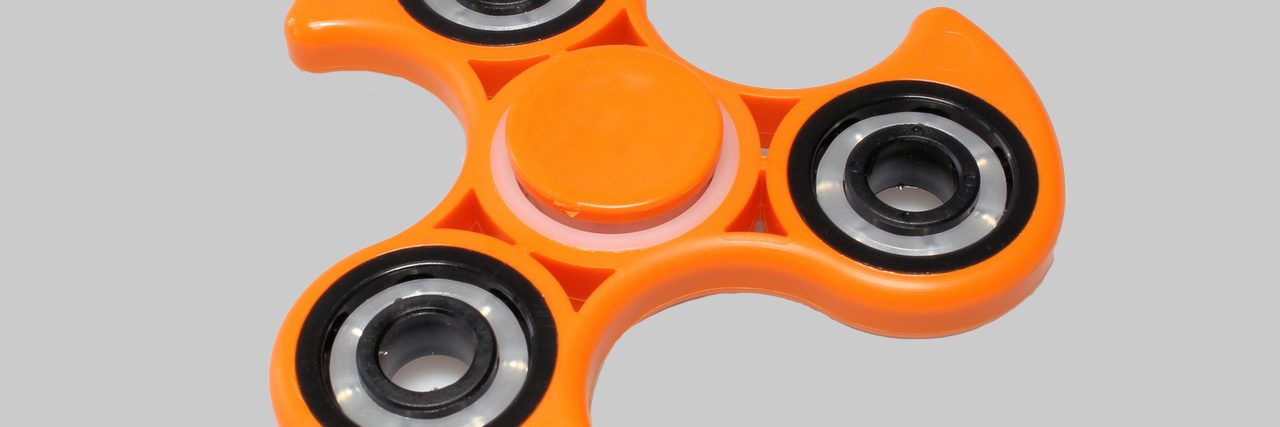Fidget toys, also described as fidget tools, have been around for years, but now, thanks to their increased popularity among students, they’re being banned from schools around the country.
Fidget spinners, which are thought to help people with autism, anxiety and ADHD, have become one of the most sought after toys of the season, selling out in stores and ranking among the most popular toys on Amazon. Now, some teachers say rather than distracting kids from their anxiety, the toys are keeping students from their work.
“I think it is beneficial for the students who actually need them, which is a very small number,” Katie Zimmerman, a teacher at Collegium Charter School in Exton, Pennsylvania told The Mighty. “Most of the students with fidgets are using them as a toy; they are focusing on the fidget rather than paying attention in classes. I do not think students should have them in class unless they have a specific need that calls for a fidget. I also think it should be limited to the students who have it listed in their IEP accommodations.”
While Zimmerman’s school has yet to ban the toys, dozens of schools – including those in Illinois, Pennsylvania and Minnesota – are starting to prohibit the spinners from their classrooms.
We asked our community what they think about schools banning fidget toys. Here’s what they had to say:
“I think it’s wrong. These are not toys, but a sensory, distress tool for kids with special needs and anxiety. As an adult with Asperger’s, I find them really helpful. They should not be taken away from those who need it and are using it as it is intended for.” – Julie V.
“Maybe we need to stop calling them toys and marketing them that way. My son needs something to keep his hands busy so he can focus on the task. This is a tool for him. I am not standing in a line for hours so he can have the newest craze. If your kid wants one, keep the damn thing home. Stop making it harder for the kids that need these tools!” – Stephanie S.
“My son has Asperger’s and ADHD. He probably needs a fidget toy, but so many neurotypical kids in his class have the spinning kind that the noise is hard for him to deal with. It’s a shame that something that has such potential for kids truly in need is being used by the general population and causing more problems in the classroom.” – Lindsay B.
“Fidget toys should be for kids and adults with autism, ADHD and other medical diagnoses. They’re being banned from schools because they’re becoming a hype instead of being used to assist those who require them. My kid’s school has banned the fidget toys from general use and only kids with additional needs and ISP and support needs are being allowed to use the fidget cubes. As an autistic adult and parent of autistic children with ADHD, I don’t think they should be on general sale to everyone. It’s now seen as a fad. We don’t all go getting wheelchairs or colostomy bags because some other person we know has one and it looks cool. They are special aids to help assist those who fidget and lack concentration skills or have anxiety and now it’s just a fad like Pokemon.” – Ros B.
“Honestly, the spinners are distracting and will not help with focus on school work. May be fine for waiting in a doctor’s office but not for focusing on work. I have one myself, and I spin it and I pay attention to the spinner. However, I think something like a worry stone or a fidget cube would be less of a distracting item and more of a focus tool.” – Erin C.
“My son has severe ADHD and is on the spectrum and while I think it may help him a little, I also warned him that if he took it to school and got it taken away for using it when not permitted, playing around with it, etc… then those were his consequences. There is a time and a place when his teacher said it was OK and if he didn’t listen, he lost it and that’s on him. His school banned them as of last night. It doesn’t bother me either way. But I think that because basically, every kid in the school had one, it’s not benefitting those that could really use it for its intended purpose.” – Rachel H.
“They are a tool to help my son with autism. My son loves his spinner. He’s using this instead of gnawing on his hands. His poor hands are scarred from anxiety.” – Mary C.
“As a teacher, I definitely understand this if they make any noise at all. Twenty kids in a class can easily lose concentration if a few have noise makers.” – Kathy M.
“I think making them less thought of as toys and more thought of as tools would help a lot. Even doing something like making these fidget devices categorized as an accommodation on a student’s IEP would help a lot with making it so only students who really needed them could have them, instead of them being thought of as toys. These fidget devices are very helpful for students who have anxiety, ADHD, or students who need to stimulate themselves. Banning them, in general, is just going to do more harm than good.” – Kira M.
Image via Florian Schäffer.

